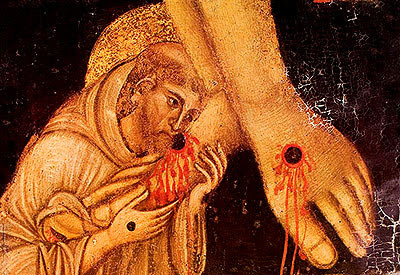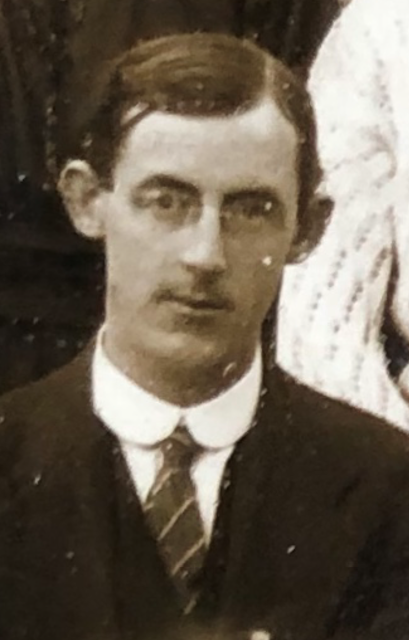Father of the Poor
Blessed Angelo Paoli (1642-1720) is one of the more recent Carmelite beati, a member of the Carmelites of the Ancient Observance, our sister Order. His feast was celebrated on the 20th January, but I missed writing a blog post on him on that day this year, but given the year that is in it, I want to mention him. Blessed Angelo spent many years of his religious life in Rome, based at the community attached to the Basilica of San Martino ai Monti, just off the via Merulana. The O. Carm. Curia is just beside it. His body is preserved in the basilica.
Angelo can be rightly described as the father of the poor. His ministry to the poor, sick and needy of Rome was renowned and manifested his extraordinary holiness. He lived in a time of great upheaval, and yet he continued to carry out works of charity while faithful to the Rule and life of Carmel. He visited the hospitals of Rome, fed the poor, aiding the victims of two earthquakes that hit Rome in the early 1700s and set up a hospice. His life was marked with humility, and though he was keen to spend himself in acts of charity, he fled from praise, preferring to be hidden. He was offered honours but refused them; twice he was offered the cardinal's hat, but he turned it down because the status would interfere in his work for the poor - the authentic living of the Gospel and love of neighbour was to be more highly prized than power and privilege.
Other projects attracted his attention. He was anxious to restore the Coliseum because it was the place where many Christians had been martyred. Though the pope at the time, Clement XI, was hesitant, Angelo was insistent and got his way. He was also a musician and served as an organist in his community.
Angelo died on the 20th January 1720, so this year marks the 300th anniversary of his passing. He was beatified in 2009. Clement XI called him the 'Father of the poor' upon his death, and Rome mourned his passing. He is a major figure in terms of Christian charity particularly in the city of Rome, yet not many people know him as well as they should. Perhaps that is something that can be addressed. To mark the third centenary of his death, the Prior General of the Carmelites of the Ancient Observance, Fr Miceal O'Neill, has issued a letter and it is worth reading. I have reproduced the letter below for your convenience.
* * *
Letter of the Prior General of the Order of Carmelites of the Ancient Observance
For the Third Centenary of the death of Blessed Angelo Paoli
20 January 2020
The Third Centenary of the death of Blessed Angelo Paoli is an opportunity for the Carmelite Family to give thanks to God and to reflect on the life of this holy man who was formed in the school of Carmel.
A little biography
Angelo Paoli was born in Argigliano, on the first of September, 1642. In his modest family, struggling financially, Angelo came to know poverty and what it meant from a very early age. He entered the Carmelite Order in 1661, at the age of nineteen, and in 1667 he was ordained a priest. Over the next twenty years or so, he would find himself in many different communities, doing a variety of very normal jobs in each community. Then in 1687 the Provincial sent him to Rome to San Martino ai Monti. With that decision a whole new chapter opened up in Angelo’s life. He would remain in that house until his death, on the 20th of January, 1720. During the thirty three years that he spent there, he began by taking care of the novices. Later he would begin to work with the sick, with visits to the hospital of San Giovanni in Laterano and to the prisons. Before very long this became his passion and his principal activity. Rome had been hit by two earthquakes and the Tiber overflowed its banks on two occasions flooding a large part of the city, The result was the appearance of countless people looking for help. Angelo began to give out bread to the hungry, to hundreds every day. At the same time, he made sure to visit the hospital and the prisons. He gained a great reputation over the years, both for his care of the people and for his care of the city. His friends were among the poorest of the poor and among the wealthy and influential in Rome. The city loved him and he loved the city as a Christian city, where the crosses that he erected in various places including the Colosseum are remembered to this day. When he died the people filled the streets all around the area of San Martino ai Monti. The father of the poor had gone.
The kind of a person that Angelo was.
We can see in Angelo's story all the essential points of Carmelite and religious formation. The story of his movements from one community to another indicates his obedience and availability. At the same time when he had to remain in one place for a long time as was his stay in the community of San Martino ai Monti he fully accepted the will of his superiors. His days were full of commitments with the sick, or inmates or those who came to the convent to seek his help. Nonetheless, he devoted a lot of time to prayer, and when it came to the Eucharist, Angelo dedicated hours and hours to the celebration. For him it was not just a matter of celebrating a Mass and that's it. In the Eucharist, as a good Carmelite, he found the presence of the revelation of God's love and followed the Mass in every detail, as participation in the work of God, manifested in the invitation of the Lord to sit at his table. The Second Vatican Council asked for the full, active and conscious participation of the faithful in the celebration of the Eucharist. It seems to me that Angelo, in the same way as other saints of the Carmelite tradition, really lived this type of participation in the liturgy, even long before the Second Vatican Council.
This same kind of active and conscious participation is evident also in his Marian devotion. It was not enough to speak of the Scapular, it was not enough to distribute the scapular to all and sundry. Angelo in his free time sewed and stitched the scapulars that he then gave to the people. In many ways we have become used to receiving things in a depersonalized way today, the supermarket approach. In Angelo's case, the Scapular made by hand by him was a sign of a serious personal commitment regarding devotion to the Our Lady of Mount Carmel.
We see the same type of commitment in his way of treating the sick. His closeness to the sick and the poor was not the kind of minimalist duty that many poor have to tolerate today. Angelo's approach was different: there was a lot of personal attention, through which he identified the various forms in which the condition of the sick or poor could be improved. By shortening distances, by keeping the poor and sick close to him, he could not treat them as mere objects, or as burdens, but real brothers and sisters with whom he could share something of substance and of life. In him, perhaps, we see a glimpse of the existence of empathy between him and the poor or the sick. Empathy is the quality with which people feel united in spirit and understanding, which allows people to overcome any type of manipulation or rapid and mechanical solution. And at the same time we can glimpse another aspect of the care of the sick to which we attach great importance today, that of treating the person in an integral form. It is not enough to treat the wound in the body, it is also necessary to treat the spirit, emotions, family relationships, the social dimension. In this too, Angelo comes to us as a prophetic religious who anticipated modern times.
Angelo Paoli is also remembered for the severity of his penances. He used the favorite methods of the time, fasting and the penitential cords. Today we might ask ourselves what sense that type of penance can have. It is true that true penance many times is to face the challenges of each day without complaining, without pulling back, remembering a Jesus who did not withdraw. But it is also true that we human beings too easily seek our own will in things, and our own comfort and our advantage and opinion and to overcome that tendency and let the voice of the spirit speak in us, the voice of the other, the traditional penances may be very helpful. Everything that makes us more available to the will of God is to be considered positive and sometimes self-imposed suffering can be part of this way of understanding Christian life.
Something very original in Angelo Paoli is the interest he had for the city of Rome. It is something that we find today in the writings of Pope Francis, and in the spirituality of groups like for example the community of Sant’Egidio. In Angelo, we see a true environmentalist. He suffered from the idea of the Colosseum, a place of martyrdom that had become a large market, or worse, a large brothel. He took steps to protect the shrine, and erected a large cross visible to everyone, there and in other parts of the city. In this we must not see an act of arrogance and abuse of power, but rather the desire to respect the nature of things, and create a positive environment through the wise use of symbols. Today the creation of positive environments is something to which me might pay more attention. On the one hand we live in highly secularized environments, on the other hand the Christian faith has a wealth of profound and significant symbols that can create positive environments conducive to human growth, in any place where people gather. The Crucifix is one.
As a last point, and perhaps the most characteristic, we remember his faith which told him that whoever wants to find the Lord must look for him among the poor. Attention to the poor has been a characteristic of Carmel from the beginning. You can see it in the choice of places, the type of apostolate, the dedication to the education of the poor in many houses of the order and in the congregations that make up the Carmelite Family. Here in Angelo Paoli we find the personification of the tradition, not only in words but in attitudes and acts. It must be nice to get to the end of life and be remembered by your city, your people, your church, as the "father of the poor" and so it was for the saint whose funeral resembled the funeral of the beloved John Paul II three centuries later.
To those who receive the message of the celebration of this centenary and feel the desire to participate in some way, I wish an abundance of graces and light and I pray to God to send his blessing, through the intercession of Mary to all those who will look at the figure of Blessed Angelo Paoli, with the desire to grow in the knowledge of the love of God to love the poor and sick and to be able to say with him, "my sick".
Fr. Míceál O'Neill, O.Carm.



Comments
Post a Comment